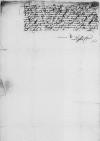List #4450
Ioannes DANTISCUS do Johann von WERDENHeilsberg (Lidzbark Warmiński), 1546-06-23
| odebrano Gdańsk (Danzig) Rękopiśmienne podstawy źródłowe:
| ||||
Tekst + aparat krytyczny + komentarz Zwykły tekst Tekst + komentarz Tekst + aparat krytyczny
Dem edlenn unnd erenvhesten hern
Freuntlichn(n) grues mit aller wolfart wunschung zuvoran(n). / Edler(r), ernfester(r) her(r), vilgeliebter(r) freundt. /
Es sein mir etliche hendel angefallen(n), / in welchen ich denn(n) hochwirdig(en)
Dat(um)


 APG 300, 53, 269, p. 110
APG 300, 53, 269, p. 110